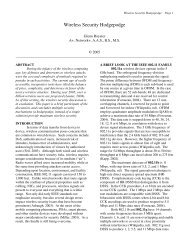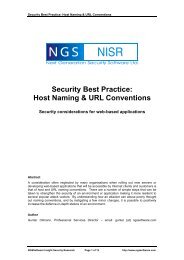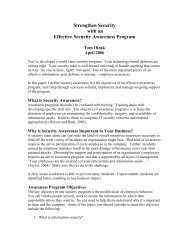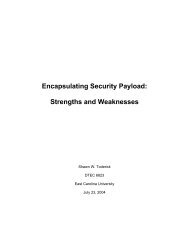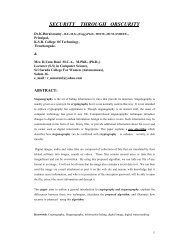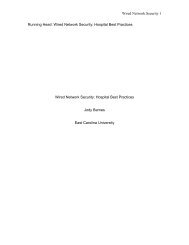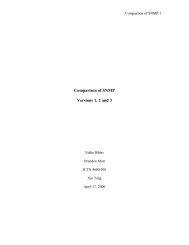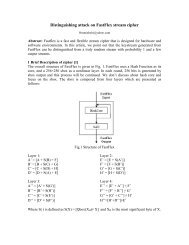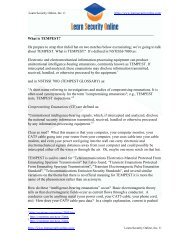Common Denial of Service Attacks - Infosecwriters.com
Common Denial of Service Attacks - Infosecwriters.com
Common Denial of Service Attacks - Infosecwriters.com
Create successful ePaper yourself
Turn your PDF publications into a flip-book with our unique Google optimized e-Paper software.
Tool”, 2002). ARP stands for the Address Resolution Protocol responsible for translating<br />
IP addresses into MAC addresses. ARP creates a cached table <strong>of</strong> addresses. This table is<br />
updated whenever a system receives a response, whether it was requested or not. An<br />
attacker can tell system ‘A’ that it is system ‘B’ and begin receiving system B’s data<br />
(“Guide to ARP Spo<strong>of</strong>ing”, 2004). A DNS server is responsible for translating host<br />
names to IP addresses. DNS spo<strong>of</strong>ing involves impersonating a valid DNS server by<br />
sending invalid DNS responses to a client requesting a host name, or domain name,<br />
resolution. The Windows XP DNS resolver is known to have this vulnerability (* Green,<br />
2005). It should be noted that hijacking tools like Hunt can be legitimately used for testing<br />
system vulnerabilities.<br />
TCP hijacking attacks can be well defended by applying the latest network system<br />
security patches, implementing intrusion detection systems and properly configuring<br />
firewalls. Using encrypted connections is a best practice in mitigating TCP hijacking attacks.<br />
Even if a connection is hijacked, an attacker will not be able to make much use the encrypted<br />
connection packet data (Whitman & Mattord, 2004).<br />
ICMP attacks include a ping <strong>of</strong> death, ping floods, and a smurf attack. A ping <strong>of</strong> death<br />
attack is very easy to administer. All that needs to be done is to issue an ICMP Echo<br />
Request, a ping <strong>com</strong>mand, specifying an IP packet size greater than 65536 bytes e.g. ping<br />
–l 65510 . Vulnerable systems will crash when attacked with this<br />
<strong>com</strong>mand. An IP packet greater than 65535 bytes is illegal, but is fragmented into<br />
smaller parts when sent to a victim. The victim machine will attempt to reconstruct the<br />
fragments and create a buffer overflow eventually causing some systems to <strong>com</strong>e to a<br />
halt.<br />
Windows 95 and Windows NT used to allow this and were vulnerable to ping <strong>of</strong><br />
death attacks themselves. Any protocol sending an IP datagram can exploit this problem.



